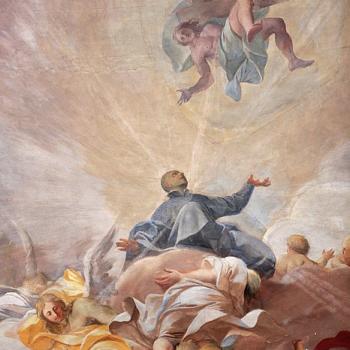This week Rachel Held Evans wrote a response to her somewhat controversial article on why millennials are leaving the church… this one focusing on why millennials need the church.
You can read it here: http://religion.blogs.cnn.com/2013/08/02/why-millennials-need-the-church
I have to say it was close to a verbatim explanation to the one I often give people who ask me why I, too, have opted to remain fully entrenched in church life. In light of her own list I thought I would share a bit of my own story about living in church world the reasons why I wanted to leave, and the primary reason why I didn’t.
It boils down to three things
1) fraternity
2) accountability
3) sacramentality
The first two, although huge motivations for my own involvement in church were often sources for more pain than comfort. The last one is why I stayed and the main way in which I continue to find life as a Christian.
- On fraternity: People attend worship services because of relationships with others. They always have. This is something quite apart from a strictly religious conviction. Churches have often been foundational institutions for the bonding of people together into communities of mutual love, support and accountability. In the vacuum left by the church, as more and more people have elected to leave organized religion, people have remained fully capable of developing and maintaining significant relationship. In my own life as a “professional Christian” I often turned to coffee shops and pubs as locations for true friendship (the life of a minister within a religious community is always somewhat fragmented by latent power dynamics and a perpetual temptation to put on airs). Still, church has remained a highly effective vehicle for making these essential human connections, so much so that some atheists, most notably Alain de Botton, have argued that Church should function as a model for non-religious communities that aim to foster intentional communities that support one another.
I can remember the years in my mid 20s when I had become deeply disillusioned with church…. having been part of a string of unhealthy congregational settings and undergoing theological shifts that had left me cynical of many of the things I had been taught. Many of my friends had walked out on church altogether, and a “church plant” I had been part of establishing had gone through a leadership change that had left be feeling betrayed and angry. I returned to the church I had grown up in but found it to be a ghost of the community I had been involved with as a teen. The Church had lost many of its members after undergoing a scandal in which the pastor had been ousted after revelations of lecherous correspondences to a women, who was not his wife, had been uncovered. There were only a few faces left that I recognized, and even fewer that I would have called friends. There was virtually no fraternity to be found.
- On accountability:
There is plenty of evil in the world, and I have contributed to it in more ways then I care to admit. Church, at it’s best, can be a place where we are challenged to confront evil in our world, our community, our families, and most importantly in ourselves. Rachel’s article highlights this element of church life stating:“We can be too idealistic, too convinced we can change the world from our iPads. The accountability that comes from participation in a local church gives young Christians the chance to speak openly about our struggles with materialism, greed, gossip, anger, consumerism and pride…. “
Sometimes we need people to help us come clean with our own shortfalls, to shine the light of honesty onto our hearts and to inspire us with opportunities to live lives of more radical love and service in our world. This too is not the sole dominion of the church, but it has been a place in my own life where this has been done the most effectively, however in my mid-20s I also had been somewhat embittered toward the atmosphere of accountability in my immediate sphere on every level.
On the personal level it seemed that any and all emphasis on sin was focused on the purely sexual. I would attend men’s groups in which each member would awkwardly confess to lustful thoughts, masturbation, pornography, and the occasional admission of less then chaste rendezvous. Although I certainly had my own failings in these areas of sexuality, I began to wonder if perhaps there was more to addressing the evil tendencies within me than going through my weekly Rolodex of sexual malfeasance.
I also had become acutely aware of a certain level of partisanship that seemed to have infected the church’s response to sin on a communal level. Although I had generally been sympathetic to the republican party as a teen, this had only been because I had seen abortion as an act of mass genocide that had to be addressed above all other issues. I had voted for George W. Bush for this reason. Slowly though I had become alarmed by the way that many of the Christians in my life had seemed to buy into the Republican platform wholesale. Soon I began to realize that there were some issues that I felt compelled to take a stand on because of my Christian faith that were not addressed by the Republican platform very well, or were actually directly opposed by the Republican platform. I would speak out about abolishing the death penalty, just war, racial reconciliation, immigration reform, creation-care, foreign assistance programs, reforming the farm bill, systemic injustice, AIDS, and child nutrition. I had become convicted that these issues were vitaly important to address alongside the rights of the unborn, but people told me that these were all secondary issues. The Church had to remain single-issue voters on the issue of abortion. All other systemic sin could be effectively ignored.
Needless to say I ceased to find the church a place of healthy accountability. In many ways my secular friends were holding me and my world to a higher and more consistent standard.
In spite of all the pain and disillusionment I had gone through I still went to church. Sometimes it pained me to go, but I went. At this point in my life there was only one reason: the sacraments.
A sacrament is a way of encountering Jesus in a scandalously embodied way. When God chose to reveal himself to the world he did not primarily do it through the Bible, as many assume. He did it in the universal human language of flesh and blood. Jesus, in his life death and resurrection, is God’s first and last word of love to humanity. It’s remarkably particular. It’s a word that lived on the same soil, drank the same water, breathed the same air, and experienced the same emotions, temptations, fear, and death that we all experience. No matter who you are and where you come from Jesus is a word you can understand.
After the Resurrection Jesus told his church that he must now go so that the Holy Spirit might come. If Christ had remained on earth I can only imagine the kind of earthly dominion he would have had. One source, one place, one nation where God’s word of love could be experienced first hand….
But that’s not how it turned out… instead we have the Holy Spirit.
Through the Holy Spirit the incarnation can become present to any person anywhere, and in the places where a special promise of this connection is made by Jesus are called sacraments.
In my own life, this took the form of weekly communion. There was something very powerful about taking my own body that was broken and discouraged, worn out and disillusioned and being able to be fed by Christ’s own body. To have an encounter that was not predicated on any emotional experience or intellectual assent. I was overwhelmed by being able to hear God’s word for me in a way that was beyond doubt or second guessing.
It was a grace that I could taste, and as I left the liturgy each week with the faint hint of wine on my own breath assured me that Christ’s body had indeed been given FOR ME.
It was in these years that I was able to find my faith in the Church again. It is this sacrament that inspired me to go to seminary, and it was this sacrament that eventually brought me into the Catholic Church. Through the sacraments I have gained a whole new way to see the world and through this sacramental worldview I have been able to embrace the body of Christ in the church in all of it’s brokenness knowing that God is uniting it to himself in all of his fullness.













